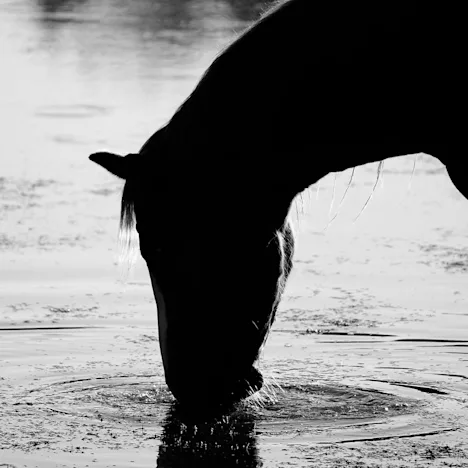Close
Our Products
All Products
Pleasure
Performance
Conditioning
Fibre
Breeding & Stud
Racing
Specialty
Supplements
Quick Feed finder
Free Diet Analysis
The Complete Range
Nutrition Centre
Articles
All About Fibre
Feeding for Condition
Competition Season
Laminitis
Breeding
Foal care
Building Topline
Gut Health
Senior horses
Racing & Breeding
Feeding in a Drought
Tools & Calculators
Competitions / Offers
Our Riders
Brand ambassadors
Junior Squad
About Barastoc
Why Barastoc
Our commitment
Barastoc's People
Our communities
Partnering with KER
Partnering with BHF
Sustainability
Find a Stockist
Contact Us

Tips for Feeding Horses in Hot Climates
Feeding horses in hot climates requires careful attention to their nutrition and well-being. As temperatures rise, horses may experience increased stress and dehydration, making it essential to provide them with a balanced diet that meets their specific requirements. In this article, we will discuss some valuable tips to ensure your horses remain healthy and thriving in hot weather conditions.
Ensuring that horses have continuous access to rock salt is crucial, as a lack of electrolytes may be one of the reasons why some horses stop sweating. Sweat contains essential electrolytes such as sodium, chloride, and potassium. Among these, sodium and chloride are commonly deficient in a horse's diet, and can be easily replenished by ordinary salt. Horses have the innate ability to seek out salt when their bodies require it. Therefore, providing them with free access to rock salt enables them to consume as much or as little as they need to meet their electrolyte requirements. In regions with extremely hot and humid climates, it is advisable to avoid using salt blocks. This is because horses find it challenging to lick enough salt off the blocks to fulfil their salt requirements, especially when they need larger quantities of salt.
It is advisable to utilize an electrolyte supplement, particularly when the horse is engaged in physical activity. These supplements enable horses to quickly replenish their electrolyte levels after exertion. It is crucial to select an electrolyte product that offers a balanced combination of electrolytes, mirroring the quantities present in a horse's sweat. Ideally, select an electrolyte that contains betaine. Betaine functions as an osmolyte, exhibiting a strong affinity for retaining water. When horses consume betaine, their body cells absorb it, facilitating enhanced water retention and hydration. Scientific research has demonstrated that betaine effectively mitigates the adverse effects of heat stress in cattle (Gaughan et al., 2005). Additionally, avoid products abundant in glucose or sugar while also lacking adequate amounts of essential electrolyte minerals such as sodium, chloride, potassium, calcium, and magnesium.
Avoid providing excessive amounts of protein in the feed, as it can have adverse effects on horses that are unable to sweat. Firstly, protein generates significant heat during the process of digestion and metabolism, adding to the already onerous task of dissipating heat to maintain a normal body temperature. While most horses can easily manage this through sweating, those unable to sweat face additional challenges in staying cool. Secondly, an excessive protein intake requires the horse to eliminate excess nitrogen present in the protein. In healthy horses, the kidneys handle this task effortlessly. However, the removal of nitrogen also results in the excretion of substantial amounts of water and electrolytes, potentially leading to dehydration and electrolyte imbalances. This is particularly detrimental for horses that cannot sweat adequately. To limit protein levels in diets, it is advisable to incorporate controlled amounts of protein-rich forages and feeds such as lucerne, copra meal, lupins, faba beans, sunflower/soybean/canola meals, pollard, and rice bran. Additionally, prioritize the consumption of grassy pasture, hay, oils, and lower protein cooked cereal grains (where safe) to meet nutritional requirements.
For horses engaged in physical activity, it is recommended to consider a reduced forage diet. Fermentation of fibre in the hindgut during the digestion process generates significant heat, thereby increasing the overall heat load on the horse to maintain a normal body temperature. By decreasing the amount of forage and fibre in the diet, the heat burden on the horse can be reduced. To ensure adequate energy intake, the diet can be supplemented with oil (preferably, as it produces minimal heat) and/or cooked grains. It is crucial to feed well-cooked grains, with extruded grains being the optimal choice, as the starch present in these grains can be digested in the small intestine. Feeding raw or undercooked grains promotes fermentation and heat production in the hindgut, making it unsuitable for all horses in hot climates.
Please note: Never reduce forage intake below 1 kg/100 kg of bodyweight and be mindful of the increased risk of stomach ulcers for horses on low forage diets. Using slow feeders is highly recommended. It is also essential to have your horse’s stomach full of forage before it is worked.
Ensure that the diet you provide to your horse is well-balanced. There is some anecdotal evidence that suggests deficiencies in minerals and vitamins can potentially hinder a horse's perspiration ability. To effectively address this issue, it is crucial to ensure that the food you are providing fulfils all the necessary requirements of your horse in terms of essential macro and trace minerals, as well as vitamins.
Use our diet analysis tool to ensure your horses diet meets all their needs - https://www.barastochorse.com.au/diet-request